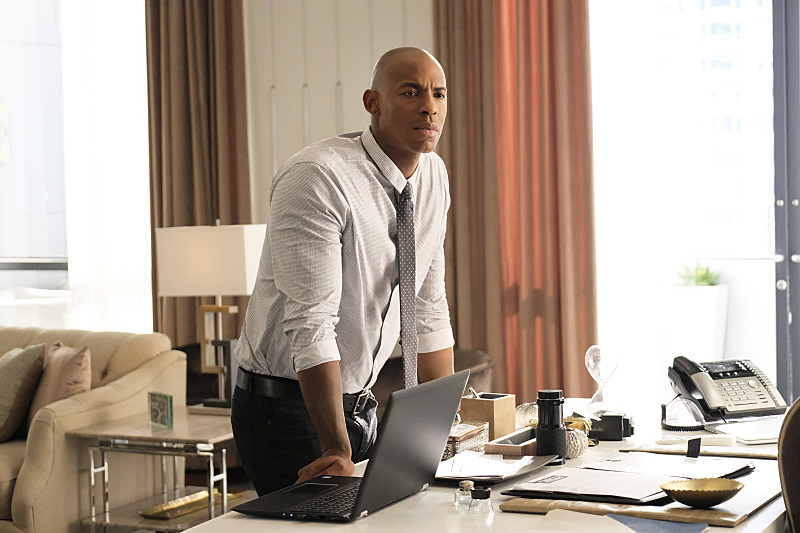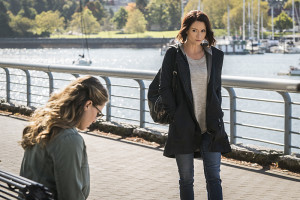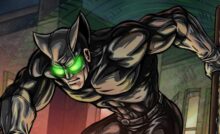

Supergirl -- "The Darkest Places" -- Image SPG207b_0293 -- Pictured: Mehcad Brooks as James Olsen -- Photo: Robert Falconer/The CW -- é 2016 The CW Network, LLC. All Rights Reserved


This was one of the strongest episodes in a few weeks, though it did suffer from familiar issues. The key success here was Alex’s coming out story, which was just as honestly written, observant and emotional as you would hope. Chyler Leigh was absolutely terrific here in a role that required so much emotional depth, spinning from giddy optimism to heartbreak in just a few scenes and making every single shift convincing.
The Parasite proved to be a visually engaging villain, even if the back-story of Parasite as an environmentalist mostly fell by the wayside as the green message became reduced to tossed-away platitudes. Likewise, the Guardian story had its ups and downs – it’s a fundamentally shaky conceit that rests on questionable character choices, but it was undoubtedly a great moment to see James suited up and in battle.
With its open-minded, compassionate approach to the theme of change and the intriguing emergence of unexpected heroes from all sides of the cast, Changing was a winner despite its flaws.
Verdict: Crammed to the gills with incident, The Darkest Places is a thrilling episode that serves up four compelling stories as a testament to how expansive this show has become, even if there’s simply too much story here to let every plot twist land.
Review:
The Darkest Places is an odd episode. Not because of the events that transpire within it, because most of the plot developments serve as natural continuations of ongoing plotlines, and the big twists generally line up with popular fan theories. It’s more unusual because of the way in which it chooses to tell those stories. Season two has generally slowed things down from the often frenetic first season, tightly focusing on individual themes and allowing scenes to play out till their natural conclusion, and the arc plot has mostly been a background affair, progressing leisurely with a few new nuggets of information doled out this week. The Darkest Places is a rare season two entry, therefore, because it abandons that measured approach and goes completely bananas, with an onrush of developments and twists that propel forward each plotline to surprising new places.
As a consequence, this is easily the most flat-out entertaining episode of the season, as it’s easy to become swept up by the mad rush of things upon things happening. It’s admirable, therefore, that The Darkest Places keeps a careful eye on character throughout, with most of the stories focused around a particular theme that satisfyingly builds upon what came before. There is a drawback, however, to the ‘throwing everything at the wall’ approach, and it’s the way in which the stories don’t tie together naturally. There’s parallels here and there – J’onn and Kara’s tie together to a certain extent – but the episode is focused on so many ideas that the overall experience is more disparate than usual. As exciting as they are, this is at least two very different episodes stuffed into one, which can lead to a slightly chaotic viewing experience.
Even within the plotlines themselves, there’s a hell of a lot going on. Take Kara’s travails, which pack in a trip to Cadmus, the appearance of Cyborg Superman, major advancement in her burgeoning romance with Mon-El, the temporary loss of her powers and finally the return of Jeremiah. It’s almost overwhelmingly eventful, and not everything sticks. Cyborg Superman, for instance, is mostly a bust – David Harewood evidently relishes the chance to dive into Hank Henshaw’s unrestrained evil, but the character is awkwardly crowbarred in (to say nothing of the contrived name-drop, which makes no sense in context) and vanishes from the plotline after just one fight scene. Yet I found Kara’s story to be rewarding on the whole, with the pile-up of ideas coalescing soon enough into a compelling exploration of the two different types of family that Supergirl has always been fascinated by.
On one end, there’s the issue of family that’s tied together by blood. We can put Cadmus’ megalomaniac head honcho, Lillian Luthor into that box. Fittingly for a character who we were introduced to after her children, Lillian is motivated primarily by a need to protect her own blood from the alien outbreak that she believes will dilute it, and a desire to take revenge upon the ‘crimes’ committed towards her son. In her blindly paternalistic attitudes, Lillian can only comprehend the traditional definition of family – one that’s tied together throughout the generations. For her, as with Astra last year, blood is bond, and that’s an idea that evidently dominates her thinking, with her protective attitudes allowing her to deceive herself into thinking that she’s working for a greater good, saving the lives of her children, with her terrorism.
The Darkest Places, however, is more interested with family that’s defined by simple human connection. Increasingly so this season, the DEO crew have seemed like one big extended family united by their knowledge of Kara’s identity and their genuine love for one another, and The Darkest Places takes a great step towards drafting Mon-El into that family, as the privileged Daxamite continues his pivot towards altruism. Kara and Mon-El’s prison conversation is one of the episode’s strongest scenes, relying simply on the natural chemistry and believable charm of Melissa Benoist and Chris Wood rather than the bombast displayed elsewhere. Benoist and Wood have worked up a really entertaining odd-couple rapport in recent weeks, but it was arguably more satisfying here to see something deeper, as Mon-El’s increasing empathy allows him to identify further with Kara’s pure desire to help people, and even open up to Kara about a deeply-held secret (unfortunately, that’s cut off, but it’s something to do with his life on Daxam). It’s been a slow-burn of a transformation for Mon-El, but that makes his adoption of some of Kara’s attitudes, just as Kara takes a little of his open-mindedness and bravado, all the more convincing and satisfying. If this was all a lengthy lead into a relationship between the two, then Supergirl has fully justified it, with the precise scripting and strong performances selling a genuinely believable evolution of their relationship from the uneasy spikiness that came before.
It’s also thoroughly fitting given the contrast that’s drawn between the two different types of family that The Darkest Places finally sees the return of Kara’s adopted father, Jeremiah. As Kara sums up in her moving conversation with J’onn, her adoptive family don’t have the official status of her late family on Krypton, but they provided her with the genuine love and support that any good parent would give. Therefore, Jeremiah’s entry works perfectly as the confirmation of the power of human connection, and the ability of the concept of family to take many forms beyond just blood bonds, reminding Kara of the selfless love that was in her life as Jeremiah pops up briefly to save her and Mon-El while sacrificing his freedom. In his brief appearance, it’s notable that Jeremiah’s actions here solely defined by his desire to help others, even a man he doesn’t know. Interestingly in the longer run, though, Jeremiah comes back in with a father figure already existing in Kara’s life, J’onn. Given the difficulty of defining just how much authority someone who spent 15 years away can have, there’s scope for a really interesting conflict between the two men once Jeremiah makes it out. After all, it’s great that family can take many forms – but with no concrete factor like blood to define things, who has the authority to decide what this created family means?
J’onn’s story branches off in a very different direction to Kara’s, but there’s the key overarching motif of blood to tie them together, as J’onn begins to feel the after-effects of the blood transfusion given to him by M’gann. It’s a slower-burning plotline than most, but it reaches an impressive crescendo when J’onn realises the truth about M’gann and goes to confront her. For one, it allows David Harewood to really let loose in his depiction of J’onn’s blind fury as his rage at the sheer image of the race that systematically destroyed his people clouds over the rationalism that typically dominates his life. Harewood’s performance verges on the villainous in its unabashed intensity (there’s a distinct similarity between his performance in this scene, and his turn as Cyborg Superman), and that adds to the overall effect of the scene, which is a fascinating manipulation of our sympathies. Just who are we meant to root for in this scene?
J’onn, while understandably traumatized and shocked by the deception and the powerful memories it brings back of his suffering, becomes the unequivocal aggressor here, adopting the same violence and then authoritarian behaviour in imprisoning M’gann to ‘rot’ that he condemns in the White Martians. Curiously, then, it’s M’gann who seems to be the more sympathetic for a time thanks to her convincing story of an attack of conscience while on Mars, but that means we’re being conditioned to take the side of someone who we’re barely familiar with, and almost certainly participated in genocide beforehand anyway. It’s a compelling, surprisingly thought-provoking exploration of the way in which prejudice can override principles, destroying any kind of empathy or nuance, and I’m really intrigued to see how it plays out next week with the immediacy of J’onn’s ongoing transformation leaving us on a major cliffhanger.
It’s a less significant part of the episode than last week, but The Darkest Places does serve up some developments for Alex and Maggie, who ended last episode on a pretty difficult note. Taken in isolation, this plotline continues to bring a sense of nuance and emotional realism that’s unrivalled elsewhere on the show, capturing the difficult specifics of Alex’s feelings of pain and resentment with admirable clarity and thus ensuring that they seem understandable and sympathetic rather than contradictory. It’s essentially an elaborate way to park the forward movement of their relationship for the time being, but the episode gets to that place of a resumed friendship satisfyingly, turning the major realisation of the week onto Maggie instead of Alex in a nice inversion of what came before, showing how both women have to work towards an understanding of this awkward situation in tandem. It’s not quite as satisfyingly integrated into the wider narrative as the previous couple of episodes – there’s not much of a thematic link to the action going on elsewhere, which can sometimes diminish the significance of events due to the drastically lower stakes here than elsewhere. Nonetheless, it’s a solid progression for both characters, and a nice way to round out Alex’s initial arc of realisation that shows just how far she’s come in her understanding of her own emotions and desires.
The story that really doesn’t come together here, both individually and in the wider context of the episode, is James’ Guardian story. It’s a shame, because there are kernels of something interesting going on here. Winn and James’ terse interplay and debate over how far the Guardian quest can be pushed in the face of increasingly dire circumstances are engaging, as is the amusingly quick confession that Winn gives under pressure from Alex. And in terms of the direction, it’s commendable stuff, with Glen Winter lending the action scenes with Guardian a visceral, kinetic feel that allows the big moments like Guardian landing after an explosion to truly have an impact, allowing us to get acquainted with James’ uniquely pragmatic, Winn-directed fighting techniques. Yet it’s hard to shake the feeling that this plotline is happening on the wrong show.
The comparisons to Arrow, and the similar story it told recently with Vigilante are cheap, but they’re informative of this plotline’s failings. For one, a story like this is at odds with both the themes and feel of this show. A gritty, testosterone-fuelled battle of physical dominance between two men really doesn’t fit a show that has flourished by telling its stories through a more feminine lens in contrast to the other two male-led hero shows (Legends is a little murkier – although, let’s be honest, the real hero of that show is Sara). Likewise, it reduces the overarching theme that anyone can be a hero by bringing their own skills and perspective to the fray, as James deviates from his career path and crafts a new identity just so he can fit a conventional image of a hero who directly fights crime. And on a more practical level, the plotline, and the breadth it needs, is compressed to an inch of its life within the jam-packed The Darkest Places. Arrow’s take on a similar idea had the benefit of serving as the episode’s principle focus, which allowed it to sketch out the two contrasting perspectives in nuanced detail while adding a specificity to the debate that fit the ongoing character arcs of that show. All The Darkest Places has time to do with James is to run through the vanilla-flavour take on a battle between lethal force and saving lives, ticking off the brief talking points on either side and allowing both heroes to do battle, with the ‘good’ vigilante establishing his approach as the better one. It’s deeply generic if well-made, and its links to the rest of the episode are tenuous on a thematic level because it lacks the depth and emotional complexity that’s on full display elsewhere. Therefore, its value to the episode as a whole is limited, and you can feel the momentum of the stronger plotlines drag a little when we have to return to a plotline that lacks so much of what makes Supergirl unique, instead feeling like it could have been ported over from Arrow or even Flash with very few specific changes needed.
There’s a lot to love in The Darkest Places. Both Kara and J’onn’s stories serve as two sides of a fascinating coin, exploring themes of compassion versus prejudice and the power that surface images can hold over us if we allow them to, while Alex’s story continues to exhibit all of the quiet, emotional complexity that made it so strong in the first place. But it’s also a deeply overstuffed episode that verges on messy all too often, throwing so many elements into the mix that the episode can scarcely pause to reflect on anything. There are plenty of great twists here, and it’s arguably missed potential to cram them next to each other instead of spreading them out and giving each the time they need to breathe and develop naturally. Nonetheless, it’s still a thoroughly entertaining and often affecting lead-in to next week’s winter finale, and the key elements that make Supergirl such a unique part of the comic book television landscape are present and correct here. The Darkest Places shows how fantastic Supergirl could be with just a little more restraint on its ambition, and there’s certainly something encouraging in that.
Odds & Ends
Louis Rabinowitz is a British online writer, and a fan of all things superhero and sci-fi. His favourite show is, and probably always will be, Doctor Who, but he also enjoys shows like The Flash, Arrow and The Walking Dead. Never ask him who is favourite superhero is, unless you have an hour or two free while he decides. Follow him on Twitter at @Rabinovsky.
DC Studios and Warner Bros. have released a new sneak peek for the new Superman…
A leaked call sheet may have revealed Smallville stars' presence in James Gunn's new Superman…
On TalkVille, the reality of the current status of the Smallville animated project was discussed.
John Schneider has been added to the 2025 Salute to Smallville convention in Chicago from…
Annette O'Toole discusses her biggest regret from her time on Smallville.
John Glover and Adrianne Palicki will be attending the 2025 Salute to Smallville convention.

